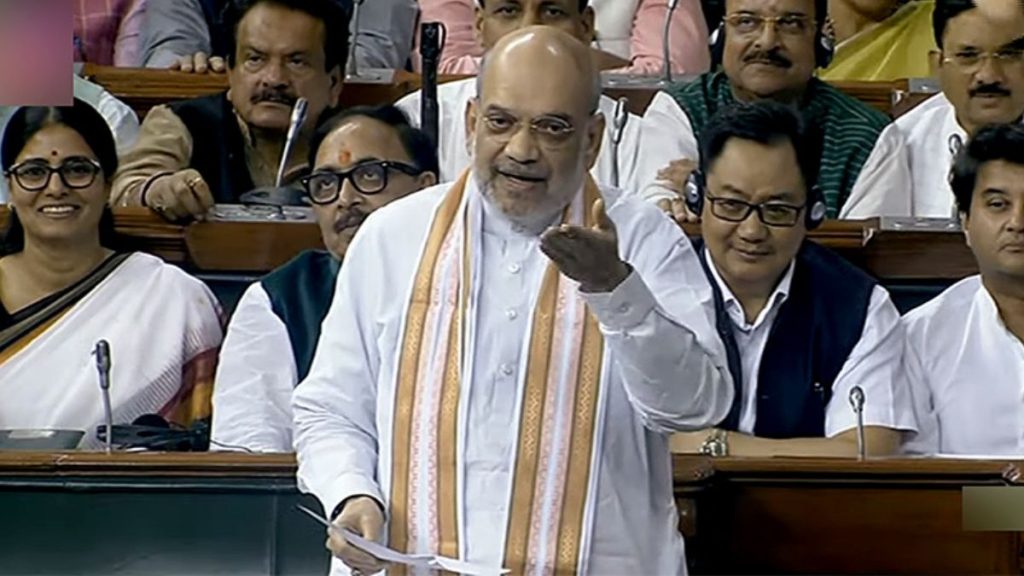
Union Home Minister Amit Shah said that changes have been brought in the laws to provide speedy justice and create a legal system that meets contemporary needs and aspirations of people
The British era sedition law against which there have been allegations that it is often being misused against activists, journalists and adversaries will soon become history. Among the proposed amendments are capital punishment for mob lynching, imprisonment for sexual intercourse on false promise of marriage. When Union Home Minister Amit Shah introduced three Bills in the Lok Sabha to replace the Indian Penal Code, the Criminal Procedure Code, the Indian Evidence Act and to repeal the sedition law, the decision came as a surprise.
The Indian Penal Code, 1860, will be replaced by Bharatiya Nyaya Sanhita Bill, 2023, the Criminal Procedure Code, 1898, will be replaced by the Bhartiya Nagarik Suraksha Sanhita Bill, 2023, and the Indian Evidence Act, 1872, will be replaced by the Bharatiya Sakshya Bill, 2023. Sources say that the soul of the three new laws will be to protect all the rights given to Indian citizens by the constitution, and, their purpose will not be to punish but to give justice. These three laws made with Indian thought process are likely to bring a huge change in our criminal justice system.
The Union Government claimed that 18 States, 6 Union Territories, the Supreme Court, 16 High Courts, 5 Judicial Academies, 22 Law Universities, 142 Members of Parliament, around 270 MLAs and public have given their suggestions on these new laws. The Home Minister said that for 4 years intense discussions were held on these laws and he himself was present in 158 consultation meetings.
The Bhartiya Nagarik Suraksha Sanhita Bill, which will replace CrPC, now has 533 sections, 160 sections of old law have been changed, 9 new sections have been added and 9 sections have been repealed. Bharatiya Nyaya Sanhita Bill 2023, which will replace the Indian Penal Code, will have 356 sections instead of the earlier 511 sections, 175 sections have been changed, 8 new sections have been added and 22 sections have been repealed. Bharatiya Sakshya Bill, which will replace the Evidence Act, will now have 170 sections instead of the earlier 167, 23 sections have been changed, one new section has been added and 5 have been repealed.
The law expands the definition of documents to include electronic or digital records, e-mails, server logs, computers, smart phones, laptops, SMS, websites, locational evidence, mails, messages on devices. Provision has been made in this law to digitize the entire process from FIR to case diary, case diary to charge sheet and charge sheet to judgement. Videography has been made compulsory at the time of search and seizure which will be part of the case and will not implicate innocent citizens. Without such recording by the police no charge sheet will be valid. On the one hand, laws like sedition have been repealed, while provision of punishment for heinous crimes like exploiting women by cheating and mob lynching have been made, provisions have also been made for crack down on organized crimes and terrorism.
Union Home Minister Amit Shah who introduced the Bharatiya Nyaya Sanhita Bill, 2023, Bharatiya Nagarik Suraksha Sanhita Bill, 2023 and Bharatiya Sakhshya Bill, 2023, in the Lok Sabha observed that from 1860 to 2023, the criminal justice system of India continued to be operated on the basis of the laws made by the British Parliament. He said that in August 2019, he had written letters to all the judges of the Supreme Court, the Chief Justices of all the High Courts of the country and all the law universities of the country. In 2020, letters were written to all MPs, Chief Ministers, Governors and Administrators of Union Territories.
Amit Shah said that “these three old laws were full of signs of slavery, they were passed by the British Parliament and we only adopted them. These laws refer to Parliament of the United Kingdom, Provincial Acts, Notifications by the Crown Representative, London Gazette, Jury and Barristers, Lahore Government, Commonwealth Resolutions, United Kingdom of Great Britain and Ireland Parliament. These laws include the references to Her Majesty’s and by the Privy Council, these laws were based on the Copies and Extracts Content in the London Gazette and Possession of the British Crown, Court of Justice in England and Her Majesty’s Dominions are also mentioned at many places in these laws. He said that by ending these 475 signs of slavery, we have brought new laws today. We have tried to connect the new era with these laws. Our criminal justice system takes a long time, justice is delivered so late that justice has no meaning, people have lost faith and are afraid to approach the court”.
The Home Minister said that even after 75 years of independence, our conviction rate is very low, that is why we have worked to promote forensic science. Now in a span of three years, the country will get 33,000 forensic science experts and scientists every year. The government has set a target to take the conviction ratio above 90 percent. For this, an important provision has been provided which will make the visit of the forensic team to the crime scene compulsory for offences punishable for seven years or more. Through this, the police will have scientific evidence, after which the chances of acquittal of the culprits in the court will be significantly reduced. All the courts in the country are expected to be computerized before the year 2027.
Zero FIRs are being facilitated to ensure the convenience of the citizens and wherever the crime may have happened, the citizens will be able to lodge complaints even outside of their police station area. Within 15 days of the registration of crime, it will have to be forwarded to the concerned police station.
The provision of e-FIR is being started and each district and police station will designate a police officer who will inform online and in person about the arrest to the family of the arrested person. The statement of the victim has been made compulsory in the case of sexual violence and video recording of the statement has also been made compulsory in the case of sexual harassment. It will be compulsory for the police to give the status of the complaint to the complainant in 90 days and thereafter in every 15 days. No government will be able to withdraw a case of imprisonment of seven years or more without hearing the victim, this will protect the rights of the citizens.
A time limit of 90 days has been fixed for filing the charge sheet and depending on the situation, the court will be able to give permission for further 90 days. In this way, within 180 days, the investigation will have to be completed and will be forwarded for trial. The courts will now be bound to give notice of framing of charges to the accused person within 60 days. The judges will have to give the decision within 30 days of the completion of the argument, this will not keep the decision pending for years, and the decision will have to be made available online within seven days.













